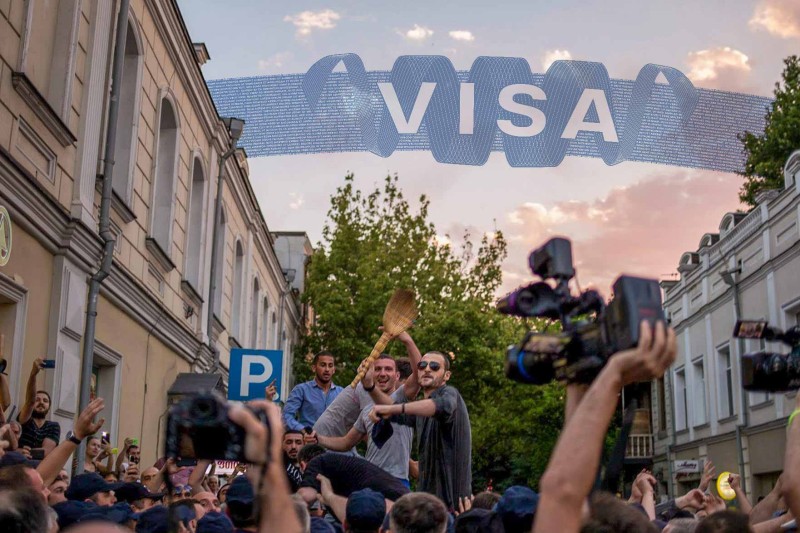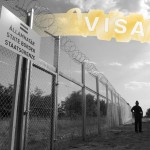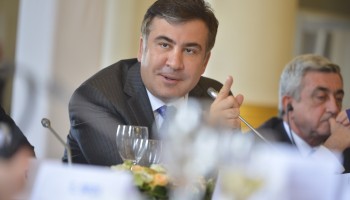In Georgian tradition, guests are “golden,” a gift from God. For the past three years, the government has seen them as more of a goldmine, offering more than 400 well-heeled foreigners permanent residence in exchange for hefty investments.
But some Georgians’ traditional hospitality appears to be turning to hostility, and not for the first time.
Foreigners have long streamed into this small Caucasus country that bridges Europe and Asia. Over the last 2,000 years, various parts of Georgia have been occupied by the Greeks, Romans, Arabs, Mongols, Persians, Turks, Russians, and Soviets.
After the collapse of the former Soviet Union in 1991, Georgia suffered a period of civil war and internal decline that delayed any thought of looking outwards. But since the Rose Revolution of 2003, Georgians have veered wildly in their attitudes towards foreigners — from welcoming them with open arms to demonstrating against them in the streets.
What happens next is anyone’s guess.
A New ‘Muslim Invasion’?
Georgia offers a number of options for foreigners who want to stay, from short-term work and study visas to renewable residency permits of up to five years. The latter are available for those who work in Georgia, invest US$ 35,000 in real estate, or run a business.
The Golden Visa, however, offers permanent residency for a much larger investment: 300,000 Georgian lari, or about $123,000 at current exchange rates. The money can be invested in real estate or used to start a business or open a company in Georgia.
Between the program’s start in 2014 and the end of 2017, 575 people applied, 466 were accepted, and 109 rejected. The numbers of those rejected rose each year, from 8 in 2014 to 13 in 2015; 36 in 2016; and 52 in 2017.
Most of those approved come from Iraq (90 people); in second place is Egypt (87 people); while third place goes to Iran, with 67 people. These figures, which cover the time period from the program’s start in 2014 until October of 2017, are provided by Georgia’s Justice Ministry, which administers the program.
Approval takes about a month. Successful applicants can go on to apply for Georgian citizenship if they wish, but this requires knowledge of Georgian language and history in addition to investment, and each application for citizenship must be approved by the president.
A Rejected Syrian Family
Several wealthy foreign businesspeople who secured the Golden Visa declined to talk to iFact.ge about their experiences, saying they did not want to draw attention to themselves.
One woman from a more modest background said that she and her husband were repeatedly rejected for a simple residence permit for reasons that seem arbitrary, or at least were not fully explained.
Najwa Al Darwish, a citizen of Syria, says she applied not once but three times — only to be turned down on each occasion.
Darwish and her husband, Monir Al Jazaerli, weren’t even trying for the Golden Visa — just for the one-year temporary permit that requires a $35,000 investment. In May of 2016, they bought a flat in Tbilisi for $50,000, which should have qualified them easily. Yet their applications were rejected on the grounds of national security, with no further explanation.
The couple tried twice more in the following year, Darwish said, because “everyone told me that I had to try, because there were people who tried a few times and finally got residency.” The government did not explain its reasons for rejecting these subsequent applications, other than to cite Article 18 of the Law of Georgia on the Legal Status of Aliens and Stateless Persons, which states that resident permits may be denied for applicants who pose a danger to state security or public safety.
Darwish says that she and her husband had been looking for investments in a number of countries, including Turkey and Azerbaijan, as “there are many problems in Syria.” They currently live in Dubai, but “in the United Arab Emirates (UAE), real estate is too expensive for us.”
Georgia looks like the couple’s last hope. But, although they own the flat in Tbilisi, Darwish has now discovered that her husband can no longer even enter the country.
“When we last came to Georgia (in June 2017), in the airport at passport control, we were told that my husband could not enter the country, only I could,” she says. “We were surprised, as we had the flat here, had been in Georgia two previous times, and had friends here. They simply said he could not enter,” and gave no further reason for the refusal.
That night, her husband flew back to Dubai.
Darwish says that it is important for them to find a legal home soon, as their UAE residency permits are good for just three years. “When [my husband’s] contract ends, or if he gets fired, we won’t have residency at all,” she explains.
She says that her lawyer assures her that the couple will succeed if they just keep trying.
“Maybe we will get it,” she says, noting that they have already invested $50,000 and had planned to invest more in growing a business, “either a kindergarten or a medical center,” “but we never got the chance.”
But she appears to be running out of optimism. “I am even afraid to come to Georgia, because the last time, my husband was rejected, and I am not sure that it won’t happen again,” she says. “I am simply tired of trying and fighting.”
She believes that the couple was rejected because they are Syrian.
A Disturbing Pattern of Rejection
Darwish’s lawyer, Anastasios Anastasiou, heads a law firm in Tbilisi that specializes in immigration issues. He says that in his recent experience, it’s very common for applicants from Muslim countries to be rejected.
Since founding his firm in 2008, he says he has worked with hundreds of investors and others who want to live in Georgia.
Anastasiou says he sees a big difference in who gets approved for all kinds of permits.
“If someone is from Europe or the United States, [the government] gives them permission to stay here in Georgia, for five years, directly, without having any documents,” he says. “[That person files paperwork to open] a new company, applies for residency and he gets it for five years, without making any investment.”
At the same time, he says, “If someone is from Saudi Arabia, he can [actually create a] big company and invest in Georgia, but they reject him. This [discrimination] started with Arab countries and now it is the same with other eastern countries like India and China.”
Anastasiou says that the government cites Article 18 for almost all of his rejected clients, and that even when he goes to court seeking the reasons behind the decision, he gets no answers — officials consider the information secret.
He believes the true reason is anti-Muslim discrimination, and that it will end up costing Georgia a lot of money, as serious investors will pull out when they fail to get the permits they expected.
Appearances Can Be Deceiving
While the government refuses to explain its reasons for rejecting applicants under Article 18, others say there are legitimate reasons for caution.
Tornike Sharashenidze is the head of the masters program in International Relations at the Georgian Institute of Public Affairs. He says that mixed in with the stream of investors and tourists coming to Georgia are an unknown number of spies and foreign agents.
“Special service agents from almost every one of our neighbors are here, not to fight against Georgia itself, but to fight each other,” he says. “Turkey, Iran, Azerbaijan, Armenia — there are too many interests and they are connected with each other. Our country can become a place for serious conflict, so we should be very careful and look at every investor to understand whether they are really investors or spies wearing the mask of an investor.”
Mahmoud Davari, a founder of the Iran-Georgia Business Development Center, agrees that some “investors” who come to Georgia have no real business or companies.
They do it, he says, because for Iranians, life in Georgia is much easier than back home. He believes that only genuine businessmen and investors should stay.
Georgia’s Golden Visa program is not advertised by either Henley & Partners or Arton Capital, two of the biggest global companies that provide so-called “citizenship services” around the world. It was, however, promoted by 2ndpassports.com, a little-known organization headquartered in Guatemala that listed an Estonian contact number but later changed it to one in Panama.
Its web page offered help obtaining temporary and permanent residency permits for foreigners in various countries. In October 2017, the site touted options in Georgia, offering a permanent residency program for €40,000, (118,400 Georgian lari) — less than the 300,000 lari required under Georgian law.
A reporter for OCCRP asked Georgian officials what they know about 2ndpassports.com, but received no response.
The reporter then contacted 2ndpassports.com by email, asking how it could provide residency by investment at less than the legal cost. The company responded, “We can offer you Georgian Residence for €40,000. We use our contacts in Tbilisi to get this done.”
The website further stated: “Georgian citizenship could well prove to be the gateway to accessing the European Union, and eventual EU citizenship.” While Georgia has applied for EU membership, the unresolved status of the breakaway regions of South Ossetia and Abkhazia make it unclear when, if ever, membership might be approved.
Subsequent to OCCRP’s questions, the Georgian offer was removed from the website.
The Islamic Republic of Iran wasn’t buying it anyway.
The Iranian embassy in Georgia issued a warning to its citizens, saying, “The claim of residence in Europe through asylum in Georgia is a trap of fraudsters” and urging Iranian nationals to conduct careful study and research before applying for citizenship or making an investment.
In a story posted on the website of the Mehr News Agency last December, embassy officials note that gaining citizenship in Georgia is not an easy matter, and that people who promised otherwise were lying. “Do not trust anonymous individuals, neither Iranians nor foreigners,” the story warns.
In addition Anastasiou, the immigration lawyer, cautions applicants to beware of people who approach them at Tbilisi’s House of Justice, the centralized location for permits and other legal documentation that handles paperwork for residency.
While they offer to help foreigners collect the necessary documents for Georgian residency, they are likely fraudsters, he says. “We asked the government to do something about them, but the situation remains the same.”
Overstaying a Welcome
Foreigners buying Georgian land and launching businesses have become a sensitive topic in Georgian politics. In the first heady years after the 2003 Rose Revolution, then-President Mikheil Saakashvili threw the doors wide open via one of the most liberal immigration policies in the world.
People from most countries could stay visa-free in Georgia for 360 days with no work permit needed. They could easily start businesses and open shops, with few regulatory hurdles to clear. While the policy helped fuel a booming economy, it also sparked backlash against the influx of foreigners. The most visible early signs of a backlash arose in 2013, when farmers began to protest the numbers of Punjabi farmers buying up fallow Georgian agricultural land. In 2017, the parliament passed a moratorium on sale of land to foreigners.
The next flash point was the growing number of Turks, Arabs and Iranians, who bought dozens of shops and restaurants on trendy Davit Agmashenebeli Avenue, a central commercial avenue in Tbilisi.
Surveys by the Caucasus Resource Research Center found that a minority of Georgians--38 percent--objected to doing business with Iranians, while 31 percent objected to Turks, but it would seem to be a fairly loud minority. By the summer of 2017, anti-foreigner groups had become very active, staging weekly marches along the avenue to protest against foreign investment.
Anastasiou says he did not detect an anti-Muslim tone during Saakashvili’s tenure as president of Georgia (2004-2013). People who had the proper documents were able to get residency, but after 2012 the incoming Georgian Dream government began making it more and more difficult for certain applicants.
However, says Anastasiou, today not even the political opposition is making the trend an issue, as they realize that the anti-foreign, anti-Muslim movement is gaining strength.
This story was produced as part of the Global Anti-Corruption Consortium, a partnership between OCCRP and Transparency International.








